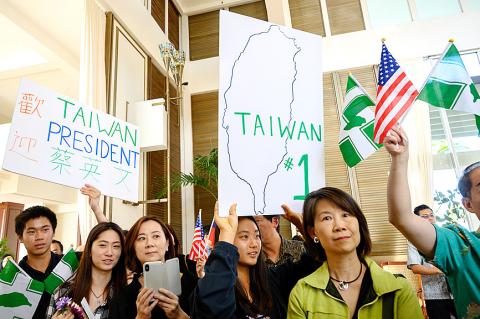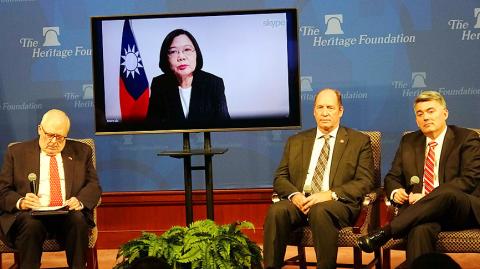President Tsai Ing-wen (蔡英文) criticized China for seeking to change the “status quo” across the Taiwan Strait, but said that the US was responding positively to Taipei’s requests for new arms sales in the face of growing pressure from China, as she spoke via video link on Wednesday during a transit stop in Hawaii to a Heritage Foundation seminar in Washington.
Despite Taiwan’s efforts to pursue peaceful coexistence, China has “used every opportunity to alter the ‘status quo’” and undermine Taiwan’s democratic institutions, heighten military tensions and limit the nation’s international space, Tsai said.
Beijing’s schemes have led to growing distrust among Taiwanese, posing an underlying challenge to the future of cross-strait relations, she said.

Photo: AP, courtesy of the Presidential Office
“China’s actions have underscored the need for Taiwan to increase our self-defense and deterrence capabilities. To be clear, we seek peace, not hostility,” she said. “We will continue to seek closer partnerships with like-minded countries so that we can fulfill the promise of the Indo-Pacific strategy,” which seeks to make nations sovereign, without being subject to coercion.
“It is rooted in our shared desire to sustain the rules-based framework that has been at the heart of this region’s prosperity since the Second World War. We believe that any effort to change that framework would be a fundamental mistake,” she added. “Taiwan is a force for good in the region. We are a democracy and the only democratic Chinese-speaking country in the world.”
Taiwan takes pride in its freedom and human rights, which are the basis of the nation’s values, and is deeply committed to fostering a more peaceful, stable and prosperous regional environment, she said.

Photo: CNA
“My administration has pledged to be much more forceful in defending Taiwan’s hard-won freedoms and ensuring that our country continues to be a beacon of democracy in the Indo-Pacific,” she said.
The government has submitted new requests to the US for M1 Abrams tanks and F-16V jets, which “would greatly enhance our land and air capabilities, strengthen military morale and show to the world the US commitment to Taiwan’s defense,” she said.
She said the process of US arms sales to Taiwan had become less politicized, adding: “We are able to have frank discussions with the US on the right equipment for Taiwan’s defense and the US is responding positively to our request.”
Mounting pressure from China for Taiwan to accept its “one country, two systems” model and Beijing’s attempts to alter the cross-strait “status quo” underscored the need for Taiwan to “increase our self-defense and deterrence capabilities,” the president said.
“Fortunately ... Taiwan does not stand alone,” she said. “The US’ commitment to Taiwan is stronger than ever.”
She said Taiwanese were also learning from Hong Kong’s experience under Beijing’s rule.
“‘One country, two systems’ will become just one country. The two systems do not seem to be respected that much,” she said.
Taiwan is taking a much more aggressive approach to counteract the Chinese government’s infiltration of its society and economy, as well as its interference in its domestic affairs, she said.
“We are also stepping up our engagements in the Pacific islands, where China has engaged in a campaign to increase its influence in the region. We have noted growing awareness of China’s efforts by the US, Australia, New Zealand and other responsible stakeholders,” she said.
Tsai thanked the US for its support in helping Taiwan maintain its diplomatic alliances, adding: “We remain committed to working with like-minded countries to protect the core values of good governance, accountability and sustainable development in the Pacific.”
Additional reporting by Reuters

SECURITY: As China is ‘reshaping’ Hong Kong’s population, Taiwan must raise the eligibility threshold for applications from Hong Kongers, Chiu Chui-cheng said When Hong Kong and Macau citizens apply for residency in Taiwan, it would be under a new category that includes a “national security observation period,” Mainland Affairs Council (MAC) Minister Chiu Chui-cheng (邱垂正) said yesterday. President William Lai (賴清德) on March 13 announced 17 strategies to counter China’s aggression toward Taiwan, including incorporating national security considerations into the review process for residency applications from Hong Kong and Macau citizens. The situation in Hong Kong is constantly changing, Chiu said to media yesterday on the sidelines of the Taipei Technology Run hosted by the Taipei Neihu Technology Park Development Association. With

CARROT AND STICK: While unrelenting in its military threats, China attracted nearly 40,000 Taiwanese to over 400 business events last year Nearly 40,000 Taiwanese last year joined industry events in China, such as conferences and trade fairs, supported by the Chinese government, a study showed yesterday, as Beijing ramps up a charm offensive toward Taipei alongside military pressure. China has long taken a carrot-and-stick approach to Taiwan, threatening it with the prospect of military action while reaching out to those it believes are amenable to Beijing’s point of view. Taiwanese security officials are wary of what they see as Beijing’s influence campaigns to sway public opinion after Taipei and Beijing gradually resumed travel links halted by the COVID-19 pandemic, but the scale of

A US Marine Corps regiment equipped with Naval Strike Missiles (NSM) is set to participate in the upcoming Balikatan 25 exercise in the Luzon Strait, marking the system’s first-ever deployment in the Philippines. US and Philippine officials have separately confirmed that the Navy Marine Expeditionary Ship Interdiction System (NMESIS) — the mobile launch platform for the Naval Strike Missile — would take part in the joint exercise. The missiles are being deployed to “a strategic first island chain chokepoint” in the waters between Taiwan proper and the Philippines, US-based Naval News reported. “The Luzon Strait and Bashi Channel represent a critical access

Pope Francis is be laid to rest on Saturday after lying in state for three days in St Peter’s Basilica, where the faithful are expected to flock to pay their respects to history’s first Latin American pontiff. The cardinals met yesterday in the Vatican’s synod hall to chart the next steps before a conclave begins to choose Francis’ successor, as condolences poured in from around the world. According to current norms, the conclave must begin between May 5 and 10. The cardinals set the funeral for Saturday at 10am in St Peter’s Square, to be celebrated by the dean of the College